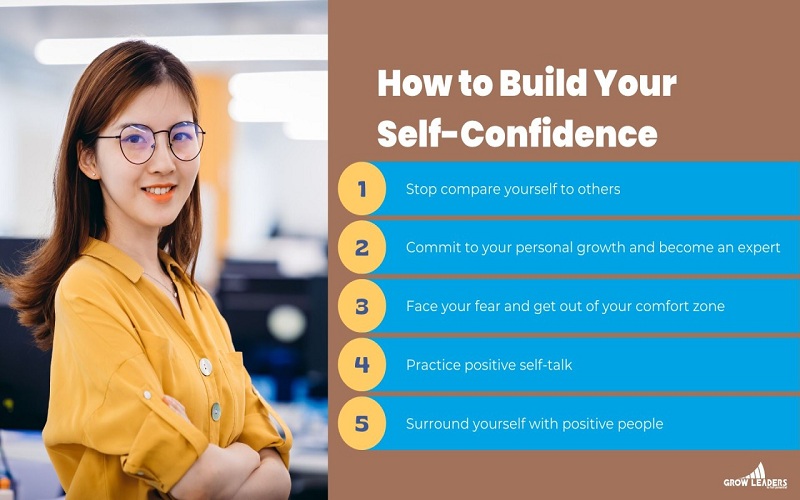One essential quality that enables people to face life’s obstacles with resiliency, assertiveness, and optimism is self-confidence. It is the conviction that one is worthy, capable, and capable of succeeding. But a lot of people lack confidence in themselves, frequently as a result of fears and self-doubt. Thankfully, deliberate practice and mental adjustments can help develop and reinforce self-confidence over time. This post will discuss useful methods and ideas for boosting self-assurance and realizing your potential.
1. Challenge Negative Thoughts
Common obstacles to self-confidence include self-limiting ideas and negative thoughts. These ideas frequently appear as negative self-talk or self-doubt regarding one’s value and skills. It’s critical to confront these self-defeating ideas and swap them out with more powerful and positive ones in order to boost self-confidence. Asking yourself challenging questions about yourself, such as “Is there evidence to support this thought?” or “What would I say to a friend in this situation?” might help you stop thinking poorly about yourself when you catch yourself. It is possible to change your perspective and create a more positive self-image by confronting negative beliefs.
Read more: 2023 Best Countries for MBBS: Study Medicine Abroad
2. Set Realistic Goals
Goal-setting and achievement are effective ways to increase self-confidence. Setting objectives that are in line with your values and skills is crucial, though, and should be reasonable and attainable. Divide more ambitious objectives into more doable, smaller ones, and acknowledge your accomplishments as you go. Every little victory boosts your confidence and gives you more drive to reach your larger objectives. You will develop self-confidence in your capacity to achieve by establishing reasonable objectives and acting consistently.
Would you like to Try some questions about yourself?
3. Practice Self-Compassion
Self-compassion is being kind, understanding, and accepting of yourself, especially when things are hard. Practice self-compassion by treating yourself with the same love and empathy that you would a friend, rather than being unduly judgmental or critical. Recognize that everyone makes errors and experiences setbacks, and treat yourself with kindness and understanding. You can build a more nourishing and positive relationship with yourself—which is the cornerstone of self-confidence—by engaging in self-compassion practices.
4. Step Outside Your Comfort Zone
Expanding your capabilities and gaining self-confidence require stepping outside of your comfort zone. Strive to overcome your worries, attempt new things, and take on new responsibilities. You demonstrate to yourself that you are capable of conquering challenges and succeeding every time you go outside of your comfort zone and face your concerns. Accept the discomfort that comes with pushing yourself to the limit and embrace growth chances because you’ll eventually gain more confidence.
5. Focus on Your Strengths
Focusing on your strengths and talents is a powerful way to boost self-confidence. Take inventory of your skills, abilities, and accomplishments, and remind yourself of your unique strengths and qualities. Instead of dwelling on perceived weaknesses or areas for improvement, celebrate your strengths and acknowledge the value you bring to the table. By focusing on your strengths, you can build self-confidence and develop a more positive self-image.
6. Practice Positive Self-Talk
Using words of affirmation and encouragement to motivate and uplift oneself is known as positive self-talk. Positive affirmations and declarations that reaffirm your value and competence should take the place of negative self-talk. Try saying, “I am capable, and I can handle this challenge,” rather than, “I can’t do this.” You may reprogram your brain to focus on your skills and qualities by engaging in positive self-talk, which will increase your confidence.
7. Seek Feedback and Support
Seeking feedback from others can provide valuable insights and perspectives that contribute to your growth and development. Surround yourself with supportive friends, family members, mentors, or colleagues who believe in you and your abilities. Ask for feedback on your strengths, areas for improvement, and accomplishments, and use this feedback to inform your self-perception and build self-confidence. Having a strong support system can boost your confidence and provide encouragement during challenging times.
8. Celebrate Your Achievements
Finally, celebrate your achievements, no matter how small. Acknowledge your successes and accomplishments, and take pride in your efforts and progress. Celebrating your achievements reinforces a positive self-image and boosts self-confidence, motivating you to continue pursuing your goals with determination and resilience. Whether it’s completing a project, reaching a milestone, or overcoming a challenge, take time to celebrate your accomplishments and recognize your worth.
A crucial quality that enables people to flourish and achieve in a variety of spheres of life is self-confidence. You can increase your self-confidence and realize your full potential by confronting negative ideas, making reasonable goals, exercising self-compassion, stepping outside of your comfort zone, concentrating on your strengths, using positive self-talk, asking for help and support, and acknowledging your accomplishments. Recall that developing self-confidence is a journey that calls for endurance, self-awareness, and patience. You may develop self-confidence and accept your own value and potential if you put in the necessary time and effort.

